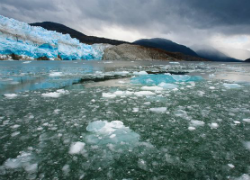We are living in a new geological epoch where humans are the foremost changers of the environmental systems upon which we depend. Nicholas Robinson, Co-Director of the Center for Environmental Legal Studies at Pace Law School, kicked off the 45th Annual Leonard v.B. Sutton Colloquium in International Law at the University of Denver Sturm College of Law with this idea about sustainability. “Humans are going to have to adapt to a changing planet and climate,” Mr. Robinson said. “We [must] do it or it will happen to us.” He cited his difficulty in traveling to Denver for the Colloquium due to Hurricane Sandy as one example of climate change “happening to us,” and our already evident challenges in adapting to it.
The focus of the Sutton Colloquium was “Approaching the Limits of Growth in the 21st Century: Sustainable Development vs. Sustainability.” Mr. Robinson made clear that the climate change and sustainability challenges that human society faces today are based on human behavior. Humans have caused these changes, and moved human society into this new geological epoch known as the Anthropocene epoch. “[T]he true meaning of the Anthropocene is that we have affected nearly every aspect of our environment—from a warming atmosphere to the bottom of an acidifying ocean.”

(National Geographic)
Mr. Robinson asked the question of whether or not sustainability is a viable model to tackle these challenges. He questioned whether the sustainability model, as it stands now, is sufficient to allow adaptation to the extreme damage caused in the Northeastern U.S. by Hurricane Sandy or if it adequately repaired the damage by Hurricane Katrina, explaining that 40 percent of New Orleans residents did not return to their city after the hurricane. A conclusive answer to this question is difficult, and Mr. Robinson stressed that there is no clear vision for the international community’s next steps toward tackling sustainability issues.
Fortunately, Mr. Robinson has a suggestion about how the sustainability debate should be tackled. If we are truly in this Anthropocene period driven by human impact, “we have to be the stewards of this [epoch].” Simply put, we must change our behavior. To do this, he suggests three principles to guide our behavior.
First, we must cooperate globally to stabilize the human relationship with nature. Principles of cooperation are already enshrined in international law, as laid out in Articles 55 and 56 of the United Nations Charter, for example. These international law principles can provide a foundation to build upon as the world community comes together to finds solutions for sustainability.
Second, we must build a stronger collective desire to protect our planet. Mr. Robinson explained the concept of “biophilia,” or the love of living things, to demonstrate that humanity has a natural affinity for the planet. He suggested that we “need to elevate this concept of love of the planet in order to protect the planet as a principle of law.” Our concern for the planet must become such that we afford it stronger legal protections.
Third, we must utilize our ability as humans to be resilient. Ecosystems have natural resilience, Mr. Robinson explained. They either reset or adapt to changes. Humans also have this type of resilience and we must capitalize on it as we adapt to change our own behavior.
These three traits can be the basis for sustainability. Without coming up with common themes like these to guide our behavior, Mr. Robinson concluded, our planet will not bounce back.
Brianna Evans is the Editor in Chief of the Denver Journal of International Law & Policy and a third year law student at the Sturm College of Law.


